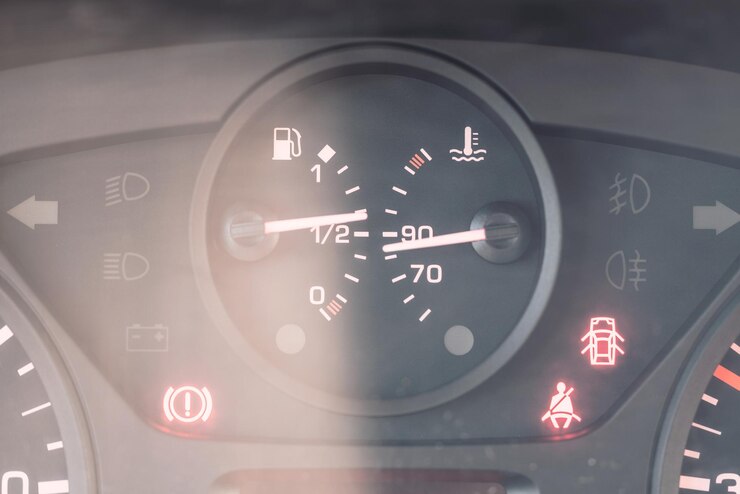The braking system is one of the most critical safety features in any vehicle. It is responsible for slowing down and stopping the vehicle efficiently. Brake fluid plays a vital role in the proper functioning of the braking system by transmitting force from the brake pedal to the wheels. To ensure optimal braking performance, it’s essential to monitor the brake fluid level and respond promptly to any low brake fluid warning lights on the dashboard. In this article, we will explore the importance of brake fluid, causes of low brake fluid, and steps to address the issue effectively.
Understanding Brake Fluid: Brake fluid is a specially formulated hydraulic fluid that operates under high temperatures and pressures in the braking system. It transfers the force applied to the brake pedal to the brake calipers or wheel cylinders, causing the brake pads or shoes to make contact with the brake rotors or drums. This friction generates the necessary stopping power to slow down or stop the vehicle.
Importance of Maintaining Proper Brake Fluid Level: Maintaining an adequate brake fluid level is crucial for several reasons:
- Proper Brake Function: Brake fluid is essential for the transfer of force within the braking system. Insufficient brake fluid can lead to a decrease in braking performance, resulting in longer stopping distances and potentially compromising safety.
- Heat Dissipation: The braking system generates significant heat during braking. Brake fluid plays a vital role in absorbing and dissipating this heat to prevent overheating of the braking components. Insufficient brake fluid can lead to increased heat build-up, which can reduce the effectiveness of the brakes and potentially cause brake fade.
- Preventing Component Damage: Low brake fluid levels can result in air entering the braking system. Air in the system can cause a soft or spongy brake pedal feel and compromise the overall braking performance. Additionally, prolonged low brake fluid levels can lead to damage to brake components such as the master cylinder or brake calipers.
Causes of Low Brake Fluid: Several factors can contribute to low brake fluid levels:
- Brake Wear: As the brake pads wear down over time, the brake fluid level may decrease slightly. This is a normal occurrence but should still be monitored closely.
- Brake System Leak: The most common cause of low brake fluid is a leak in the braking system. Leaks can occur at various points, such as brake lines, hoses, calipers, or the master cylinder. It’s crucial to address any leaks promptly to prevent further fluid loss and ensure proper brake function.
- Worn Brake Components: Worn brake components, such as seals or pistons within the master cylinder or calipers, can contribute to fluid loss. Regular inspection and maintenance of the braking system can help identify and rectify any worn components.
Addressing Low Brake Fluid: If the low brake fluid warning light illuminates on your vehicle’s dashboard, here are the steps to address the issue:
- Check Fluid Level: Consult your vehicle’s owner manual to locate the brake fluid reservoir and check the fluid level. Ensure the vehicle is parked on a level surface, and the engine is turned off. If the fluid level is below the recommended level, proceed to the next steps.
- Inspect for Leaks: Inspect the braking system components, including brake lines, hoses, calipers, and the master cylinder, for any signs of leakage. If a leak is detected, it is recommended to have the braking system inspected and repaired by a qualified technician.
- Add Brake Fluid: If there are no visible leaks and the fluid level is below the recommended level, carefully add the appropriate type of brake fluid to the reservoir. Refer to the owner manual for the correct brake fluid specification for your vehicle. Take caution not to introduce contaminants into the system while adding brake fluid.
- Seek Professional Assistance: If you are unsure about the cause of the low brake fluid or if the warning light persists even after adding fluid, it is advisable to consult a qualified technician. They can perform a thorough inspection of the braking system, diagnose any underlying issues, and perform the necessary repairs or maintenance.
Regular Maintenance and Prevention: To prevent low brake fluid issues and maintain optimal brake performance, consider the following maintenance tips:
- Regular Inspections: Perform regular visual inspections of the brake fluid level and check for any signs of leakage or component wear. Catching potential issues early can prevent further damage and ensure proper brake function.
- Brake Fluid Flush: Follow the manufacturer’s recommended maintenance schedule for brake fluid flushes. Over time, brake fluid can absorb moisture, which can affect its performance and lead to corrosion within the braking system.
- Use Recommended Brake Fluid: Always use the brake fluid specified by the vehicle manufacturer. Different vehicles may require different types of brake fluid, such as DOT 3, DOT 4, or DOT 5. Using the correct brake fluid ensures compatibility and optimal performance.
Maintaining the proper brake fluid level is essential for ensuring optimal braking performance and vehicle safety. Regularly monitor the brake fluid level and respond promptly to low brake fluid warning lights on the dashboard. Address any fluid loss or leaks in the braking system promptly to prevent further damage and maintain the effectiveness of your vehicle’s braking system. If you are uncertain about any aspect of the brake fluid maintenance or encounter persistent issues, seek assistance from a qualified technician for a thorough inspection and professional guidance.











